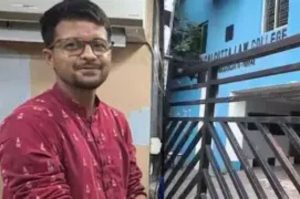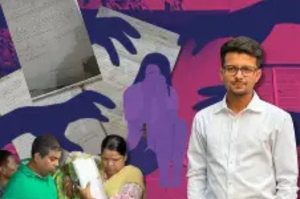Kolkata Law College Gang Rape Case: In what is being described as one of the most horrifying crimes in a campus setting in recent memory, a 24-year-old female law student was allegedly gang-raped inside her college premises by a former student and two current students, one of whom was a first-year candidate. The assault, according to official statements and evidence gathered, took place in a locked room just meters away from administrative offices in the southern Kolkata-based law college.
The case, now under the supervision of the Kolkata Police’s Detective Department, has sparked public outrage, triggered calls for judicial intervention, and exposed grave institutional failings.

Kolkata Law College Gang Rape Case: The Crime
The incident took place on the evening of June 25. The victim, a politically active student leader affiliated with the Trinamool Congress Chhatra Parishad, was reportedly lured by promises of being nominated as a key office bearer in the student union. She was led to a secluded room within the college—previously used by a guard—where she alleges she was physically assaulted, raped, filmed, and threatened with weapons.
The main accused include:
- Monojit Mishra – a former student and temporary contractual staff member
- Zaib Ahmed – second-year student
- Pramit Mukherjee – first-year student
- Pinaki Banerjee – a college security guard accused of enabling the crime by providing access and privacy
Evidence and Investigative Action
Forensic and Digital Evidence
CCTV footage from over 40 cameras is being examined, particularly a 7-hour timeline covering the night of the incident. Initial findings reportedly confirm the presence of the accused with the victim during the relevant period. Additionally, investigators have recovered video clips of the assault on the accused’s mobile phones, reportedly lasting around 90 seconds.
Advanced digital forensics tools are being used to extract metadata, timestamps, and any attempts at deletion or transmission of the videos.


Learn about digital forensic procedures in India:
https://www.ncrb.gov.in/forensic-science
Legal Proceedings
The accused were produced before the Alipore court. The court remanded Monojit, Pramit, and Zaib in police custody until July 8 for custodial interrogation. The security guard was sent to police custody until July 4. The court permitted limited access for a crime scene reconstruction and instructed that witnesses not be influenced or threatened.
Charges Invoked:
- Rape and gang rape under IPC Sections 376 and 376D
- Wrongful confinement under Section 342
- Criminal intimidation under Section 506
- Voluntarily causing hurt under Section 323
- Use of criminal force on a woman under Section 354
A dedicated team of forensic, cyber, and psychological specialists has been appointed to ensure evidence is preserved and analysed ethically.
For relevant Indian Penal Code references:
https://indiacode.nic.in
Institutional Accountability
Despite occurring in a well-frequented area of the college building, no staff member intervened during the hours of the assault. College authorities have so far issued generic assurances about cooperating with police but have not addressed why surveillance or on-campus security failed to notice such a grave crime.
Educational experts are demanding:
- Immediate external safety audits
- Compulsory counselling services
- Suspension of involved faculty or enablers pending probe
Public Outcry and Political Reactions
The brutality of the crime has led to widespread protests by student unions, women’s groups, and legal activists. Hundreds marched to the state education department’s office demanding justice and protection for female students on campus.
Opposition political parties, including the BJP, have demanded a court-monitored CBI probe, citing fears of political shielding. In contrast, the ruling Trinamool Congress stated that the police were acting swiftly and impartially.
Meanwhile, a petition has been filed in the Calcutta High Court, seeking suo motu cognizance and a direction for central oversight.
Campus Safety in Question
This case adds to a growing list of campus crimes across India, highlighting the urgent need for reformed safety protocols. Experts emphasize that colleges must be treated as sensitive zones requiring:
- 24×7 monitored CCTV networks
- Female security personnel
- Gender sensitization training
- Anonymous, fast-track grievance redressal cells
For guidelines on campus safety:
https://www.ugc.ac.in/pdfnews/3543166_Guidelines-on-Safety-of-Students.pdf
Expert Opinions
Dr. Malini Bhattacharya, Women’s Rights Activist:
“This isn’t just a law and order issue. It’s a collapse of every layer of protection society is supposed to offer women—even in educational institutions meant to teach justice.”
Advocate Soumya Basu, Criminal Lawyer:
“The presence of digital evidence like video clips makes the case legally strong. But institutional cover-up or political interference could jeopardize prosecution. Transparency is crucial.”
Similar Past Incidents
- Kamduni, West Bengal (2013): A student was abducted and raped, leading to public fury and eventual life sentences for the accused.
- Unnao (2019): A rape survivor was burned to death en route to her court hearing, exposing police-politician collusion.
- Hathras (2020): A Dalit girl was gang raped and cremated without family consent, raising constitutional and human rights concerns.
These cases echo a worrying pattern: institutional breakdowns, delayed justice, and societal impunity.
What Comes Next
- Psychological rehabilitation and protection for the survivor
- A comprehensive audit of student union activities, as politics was allegedly used to lure the victim
- Public release of a redacted charge sheet summary once available
- Educational reforms to reduce hierarchical intimidation on campuses
Final Reflection: A System on Trial
This case is more than a single act of violence—it is a chilling testament to how power, silence, and misplaced trust can be used to exploit. A law student raped inside a law college is a national failure—legal, social, and moral. Justice must not only be served—it must be seen to be done, transparently and urgently.
Further Reading & Resources
- Ministry of Women and Child Development – Safety Frameworks
🔗 https://wcd.nic.in - Justice Verma Committee Report (2013)
🔗 https://www.prsindia.org - NCRB Crime in India Reports
🔗 https://ncrb.gov.in
Also read: Home | Channel 6 Network – Latest News, Breaking Updates: Politics, Business, Tech & More

